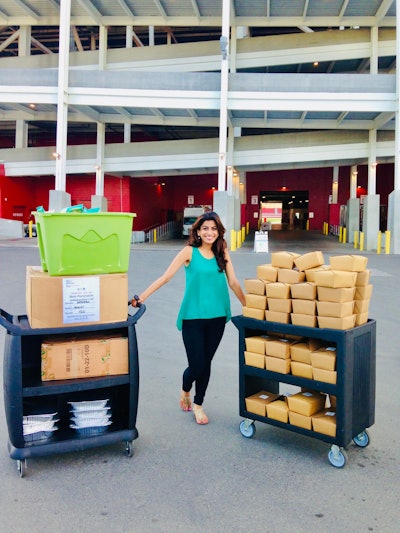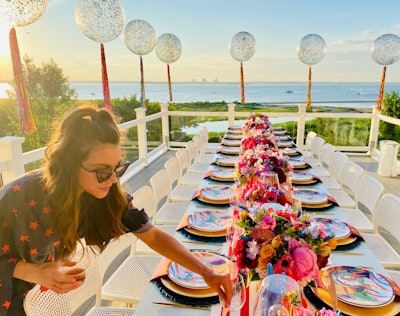
“Failure” is an intimidating word, especially when it comes to the event industry. Events take weeks, months, and even years to plan. While some mishaps occur on the operational back end, others are excruciatingly forward facing. And even though we're only human, we’re thick in the throes of the digital age, where what was once a small mistake can be blown into viral proportions, having a devastating effect on an event professional’s reputation or livelihood.
To take a deeper dive into this vulnerable topic, we tapped eight event professionals who were willing to go on the record to discuss not only lessons learned from past event failures, but how they’ve been leveraged into successful strategies. Below, read about food waste solutions, making rainy day plans, how to better enforce theme parties, strengthening client contracts, and—of course—the importance of fostering industry and vendor relationships.
Combatting Food Waste
Caryl Chinn, founder of Caryl Chinn Culinary Consulting | Los Angeles
"I always do my best to work closely with the participating chefs on guest counts, but at many of the food festivals I’ve worked on, especially in the early days, one thing that always bothered me was the wasted food at the end of the event. Ironically, many of these events were to raise money to end hunger! That was truly a failure.
 Caryl Chinn has made it her mission to eliminate food waste at California culinary events by utilizing the services of Copia and Chefs to End Hunger.Photo: Courtesy of Copia
Caryl Chinn has made it her mission to eliminate food waste at California culinary events by utilizing the services of Copia and Chefs to End Hunger.Photo: Courtesy of Copia
In 2015, I produced BITE Silicon Valley, a unique event that took place at Levi’s Stadium and focused on the intersection of food and technology. It included a one-day conference and a two-day food festival and featured celebrated chefs like José Andrés, Dominique Crenn, Michael Voltaggio, and Mei Lin. I got an email from Komal Ahmad, who had just launched an innovative organization now called Copia; they rescue food from large events and distribute it to their network of local nonprofit partners, where it's served to those experiencing food insecurity. They made the process so easy and turnkey for us, the event operator, it was a no-brainer! I am proud to say based on that introduction, Copia still works with the San Francisco 49ers (at Levi’s Stadium) today, nine years later! Copia is based in California, but operates in all 50 states, Puerto Rico, and Canada.
Here in Los Angeles, I also work with a similar group called Chefs to End Hunger. Before the event, they provide foil trays, boxes, and instructions for all the participating chefs on how to box up leftover food and what’s acceptable. After the event, their drivers come and pick up the boxes again—super turnkey for the event producer. With solutions like this available, there is no excuse for food waste being a failure!"
Always Have a Rain Plan
Tomos Evans, co-founder of Swell | New York
"We had a major activation in New York City that was disastrously rained out. Everyone and everything was utterly drenched, and the venue turned into a giant mud pit. In the planning process for the event, we highly recommended a rain plan in the event of severe weather, but budget concerns limited the ability to plan.
The biggest lesson from this event was to always insist on having a weather contingency budget and plan. Not having one is almost a guarantee that there will be a major rain event. Two years later, once again, it downpoured on us in almost the same location, but this time we had a full rain plan and the event was a great success."
Tried and Trusted Vendors
Chad Hudson, founder and president of CH Cre8tive | Los Angeles
"At a baseball event in Minneapolis, we were supposed to have silent fireworks, because the show went on later in the evening. But the local vendor put in huge shells, and it sounded like Minneapolis was under a bomb attack!
We tried to use local vendors to support the local businesses, but they were a new firework vendor for us who we had never used before. They thought they were doing us a surprise favor giving us all of the extra fireworks at no cost. Even though we had told them on many occasions how important it was that we stick to no explosions or loud bangs, they still added in the additional shells without our consent. They hadn’t attended all of the city planning meetings, where we specifically discussed this with the city council and event planning committee. Even though we drilled it in at all vendor meetings and calls, they still did it. And to make matters worse, the event was delayed two hours due to weather, so the fireworks show didn't begin until after midnight.
We had advised the client that we should maybe not do the fireworks display due to the later hour, and the rep decided that they wanted to move forward with the display anyway. In hindsight, we should have pushed back on that. I would say the lesson learned is to always use tried and trusted vendors for specialty event elements."
Building Excitement for a Theme
Amanda Orso, founder of High-Low Hostess | New York
"Several years ago, we styled a 'themed' July Fourth party in the Hamptons, and almost no one came in the color scheme or the Americana motif that the host had hoped for. She was disappointed over the lack of participation, which she unfortunately presumed was a lack of enthusiasm for her event. Likewise, her party photos weren’t as harmonized or cohesive as she had craved. And despite good food, music, and people, the vibe was a bit of a letdown for the host, and as a result, her guests too.
While themed parties can be a lot of fun, if no one participates, they can be a big downer. Obviously, an invitation should be explicit regarding any party theme—and also specific regarding attire—but sometimes, a bit of extra effort is worth it.
 Beyond decorating, High-Low Hostess Amanda Orso goes the extra mile to enforce theme parties, from sending pre-party favors to setting up flair stations.Photo: Courtesy of High-Low Hostess
Beyond decorating, High-Low Hostess Amanda Orso goes the extra mile to enforce theme parties, from sending pre-party favors to setting up flair stations.Photo: Courtesy of High-Low Hostess
To prevent any confusion and to fully solidify a party’s theme or aesthetic (not to mention to help spark enthusiasm), we love sending guests a 'pre-party favor' to help convey the mood and vibe in advance. This is a thoughtfully prepared package, which generally includes a note from the host, a few elements to showcase the theme, as well as an accessory or two that a guest may want to include in his or her event ensemble. Additionally, at the event itself, we occasionally set up what we refer to as 'flair stations' with fun accessories to help guests add to their attire or get in the party mood upon entry."
Avoiding Unintended Community Impact
Joe Moller, president of Joe Moller Events | Los Angeles
"During one of the years I produced the Skid Row Carnival of Love in Downtown LA, we used a volunteer to conduct outreach on the block where the event was scheduled to take place. Her job was to make sure all the residents with vehicles that lived on that block were aware of our schedule and how that would impact access to their respective driveways and parking access. This individual was not thorough in her outreach, and several of the residents on that block ran into scheduling conflicts accessing their parking spaces.
As a result, we had to immediately find a lot close by to redirect them to for secure parking, designate a staff member to resolve these issues in a timely fashion, and make sure the issue didn’t impact more residents. Those not able to leave their driveway were given round-trip transportation to their jobs so they were on time.
Suffice it to say, we now provide staff member support to all community-facing volunteer assignments, as well as share an email address and phone number for the community to use when we are taking over whole city blocks. The lesson that we learned was that even though nonprofit organizations rely on volunteer support, we need to ensure certain tasks are successfully completed to mitigate unintended community impact."
Never Assume
Carey McKearnan, founder of The Secret Sauce | Fort Lauderdale, Fla.
"When I was in magazine publishing, I co-founded Savor the Avenue, Florida’s longest dining room table with 1,000-plus guests, 20-plus restaurants serving custom four-course meals with wine pairings, a welcome cocktail reception, and a Champagne toast at sunset. I’d sold the spirits sponsorship to a well-known global company, and in our agreement, we clearly laid out who would bring what to the event—portable bars, garbage cans, mixers, fresh fruit, signage, how many bartenders and promotional models, etc.
I was new at giant event planning, but the global spirits company had a partnered logistics team with a turnkey system for events they participated in every week, so after several meetings to finalize and review our checklists together, I felt confident.
Thirty minutes before the event, when the freelance service staff went to set up the ice bins to serve the craft cocktails, they asked, 'Where’s the ice?' That was the one detail our agreement didn’t cover! I panicked for a minute, beating myself up. Then I went into fix-it mode. I ran door to door to each restaurant and grabbed trash bags and begged to use some ice. Since no one restaurant could give us enough ice, I kept going door to door until we had enough.
Never assume! I’ve never come across another contract that outlines who supplies the ice—it’s often overlooked or discussed, but I always write it into mine. Expect that something will go wrong, and be ready to pivot and get creative. While we were so proud of the big details, the small detail we missed could have killed my relationship with my largest client, had we served warm cocktails due to my oversight. What saved me that night was the relationships I’d created during six months of planning. Your net worth really is your network."
Good Client Relationships
Luz Mery Daniel, founder of Posh Lior Events | Cambridge, Mass.
"In February 2021, I coordinated a wedding for a previous client. The bride had everything taken care of and booked; she just needed a coordinator to make sure all the moving parts were in place and everything went according to plan. I connected with her vendors and sent over a day-of timeline. Everything was going great! Deliveries were on time, and everything was beautifully decorated 45 minutes before guests were set to arrive.
As my team headed over to the venue to finish up the final details, I stayed behind to greet the bride and groom and to ensure the ceremony went seamlessly. I received a text from the bride to inform me that they were running behind and needed me to take care of something she was unhappy with at the venue right away. I headed over to the venue to encounter an unhappy cake vendor, waiting for another form of payment since the previous form of payment had bounced. (If you wonder if her form of payment bounced for me as well, it did. It took five days after the bride ghosted me to finally receive a payment.)
At some point, during this time, the church officiant, myself, and the photographer lost all types of communication with the bride and groom. As much as I stressed the importance of having a designated contact person aside from the couple we could contact, the bride never assigned a person like she promised she would. Now, short of two hours behind schedule, when they finally arrived at the church, the groom was completely intoxicated. The church was scheduled to have its evening mass, which meant rushing through the ceremony with the intoxicated groom. By the end of the ceremony, the very livid church manager not only made an announcement asking everyone to leave the premises immediately before he called the cops, but gave my team only 20 minutes to break down.
With all that said, there is always a lesson to be learned from either a successful event or a failed event. It's a part of growing, evolving, and acquiring new experiences for any profession. The biggest lesson learned from that particular event was to make a huge change in my contracts, payment timeline, and what type of services I offer—and to whom. Not every client is for a business, and not all businesses are for all clients. Having a good relationship with your clients is just as important as having a good vendor relationship with other event professionals working on an event."
Preventing No-Shows
Shannon Casey, founder and president of Prism PR | Miami Beach
"During Art Basel Miami Beach in 2019, I worked with a luxury scent brand on a custom event activation in partnership with an international edition of a Condé Nast magazine. The brand invested significant time and financial resources in a highly personalized event experience for an intimate group of fashionable VIPs.
The morning of the event, a magazine rep called to tell me the group was exhausted from all of their activities and would be skipping my client’s event that morning to rest. I was shocked, disappointed, and terrified to relay this news to the client, who was already set up and eagerly awaiting the group’s arrival. I took a few deep breaths and calmly called the group’s liaison back explaining the level of customization and expense that had gone into the event—exclusively for the group—and asked what it would take to get them to attend. I remained calm and focused on asking how I could make this work for them, rather than demanding they join. After a brief call, we agreed to a later start time and most of the group was able to join.
In the case of this near-failure, I learned a formal agreement and deposit or penalty fee structure would prevent no-shows and protect the investment clients make in events. This practice puts clients at ease and often encourages them to make the experience extra special knowing their investment is protected."



















